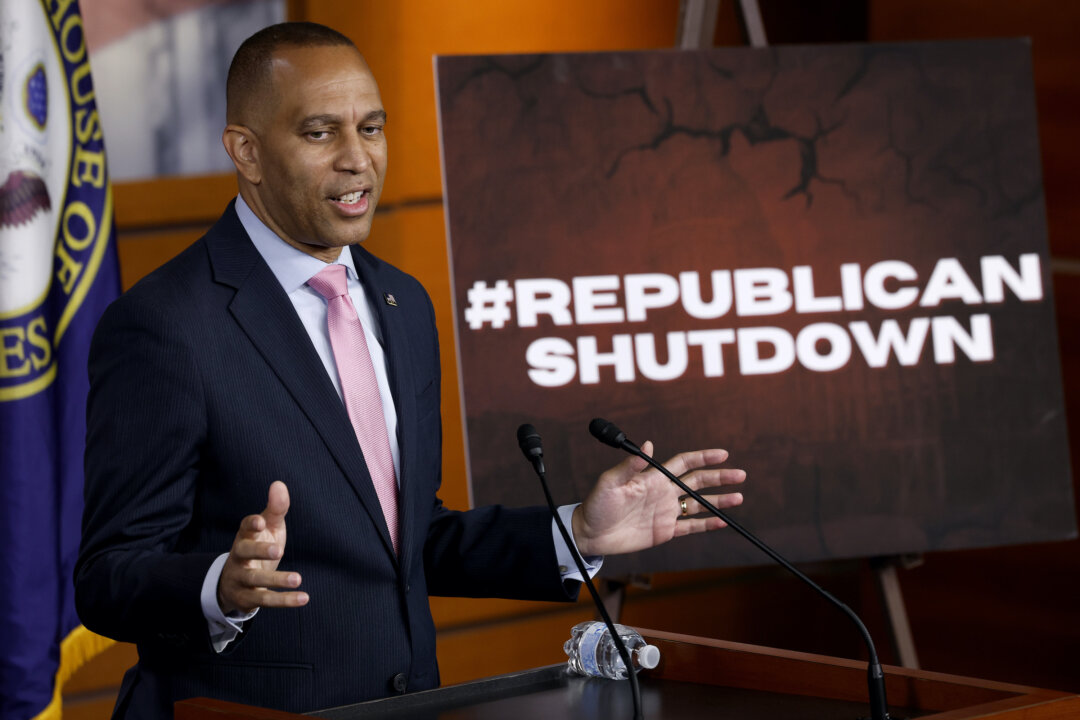Democrats want to pass permanent funding bills by the end of the calendar year, amid Republican calls to delay funding.
WASHINGTON—House Minority Leader Hakeem Jeffries (D-N.Y.) on Sept. 12 said his caucus will oppose any bill to temporarily fund the government that runs into 2025 or includes a measure requiring proof of citizenship to register to vote.
With just 18 days before government funding expires, House Republicans introduced a continuing resolution (CR) to temporarily fund the government at Fiscal Year 2024 levels until March 28, 2025—including in the bill controversial legislation seeking to prevent foreign nationals from voting in U.S. elections, known as the “Safeguard American Voter Eligibility” (SAVE) Act.
A scheduled vote on the bill on Sept. 11 was canceled by House Speaker Mike Johnson (R-La.) amid opposition within the Republican conference. On Sept. 12, Jeffries indicated that his caucus would not provide the votes to pass the bill, citing concerns with both the SAVE Act and the length of funding.
“We are simply asking traditional Republicans to partner with House Democrats in a bipartisan way,” Jeffries said at his weekly press conference. He said that the SAVE Act was part of “the Project 2025 agenda”—referring to a set of policy proposals by a conservative nonprofit group, which former President Donald Trump has disavowed.
Republican supporters of the CR said they wanted it to last until March 2025 in the hope that Republicans win control of the Senate and the White House, and the party can pass more conservative spending bills.
Agreeing with the Biden administration, Jeffries said that the government funding process must be completed by the end of 2024, before the new president takes office.
“We want to get it resolved this calendar year because that’s the only practical way to meet the needs of the American people,” Jeffries said.
He said that a “clean” CR—devoid of the SAVE Act, but of similar length, as some Republicans have suggested—would impose significant cuts to essential aspects of the government.
“The Republican, so-called clean continuing resolution cuts veterans’ healthcare by $12 billion. It shortchanges our military readiness by $6 billion. It will result in the elimination of at least 2,000 jobs, it appears, from the Social Security Administration and undermine Social Security as we know it, and it will shortchange disaster assistance by about $25 billion,” Jeffries said.
The House adjourned for the week shortly after Jeffries’ remarks. Both houses of Congress must pass a CR before Sept. 30 to avoid a shutdown, which would occur just one month before the general election on Nov. 5.
Republican opposition to the CR has emerged from fiscal conservatives in the House.
“I refuse to be a thespian in the Speaker’s failure theater. The 6-month continuing resolution with the SAVE Act attached is an insult to Americans’ intelligence. The CR doesn’t cut spending, and the shiny object attached to it will be dropped like a hot potato before passage,” wrote Rep. Thomas Massie (R-Ky.) on X.
Other Republicans believe that funding the government at the previous fiscal year’s levels is unacceptable and want to stop spending money on certain programs.
“The awful omnibus we passed in March spent taxpayer dollars on abortions and gender transition for minors. Why would I vote to keep funding that nonsense? I’m a no on the CR,” wrote Rep. Jim Banks (R-Ind.), who is also the party’s U.S. Senate nominee in Indiana, on X. “Why would I vote to continue that spending when our national debt is over $35 trillion and growing by $1 trillion every 100 days?”
“We’re having thoughtful conversations, family conversations within the Republican conference,” said Johnson when asked on Sept. 11 about a path forward. “I believe we’ll get there.”

